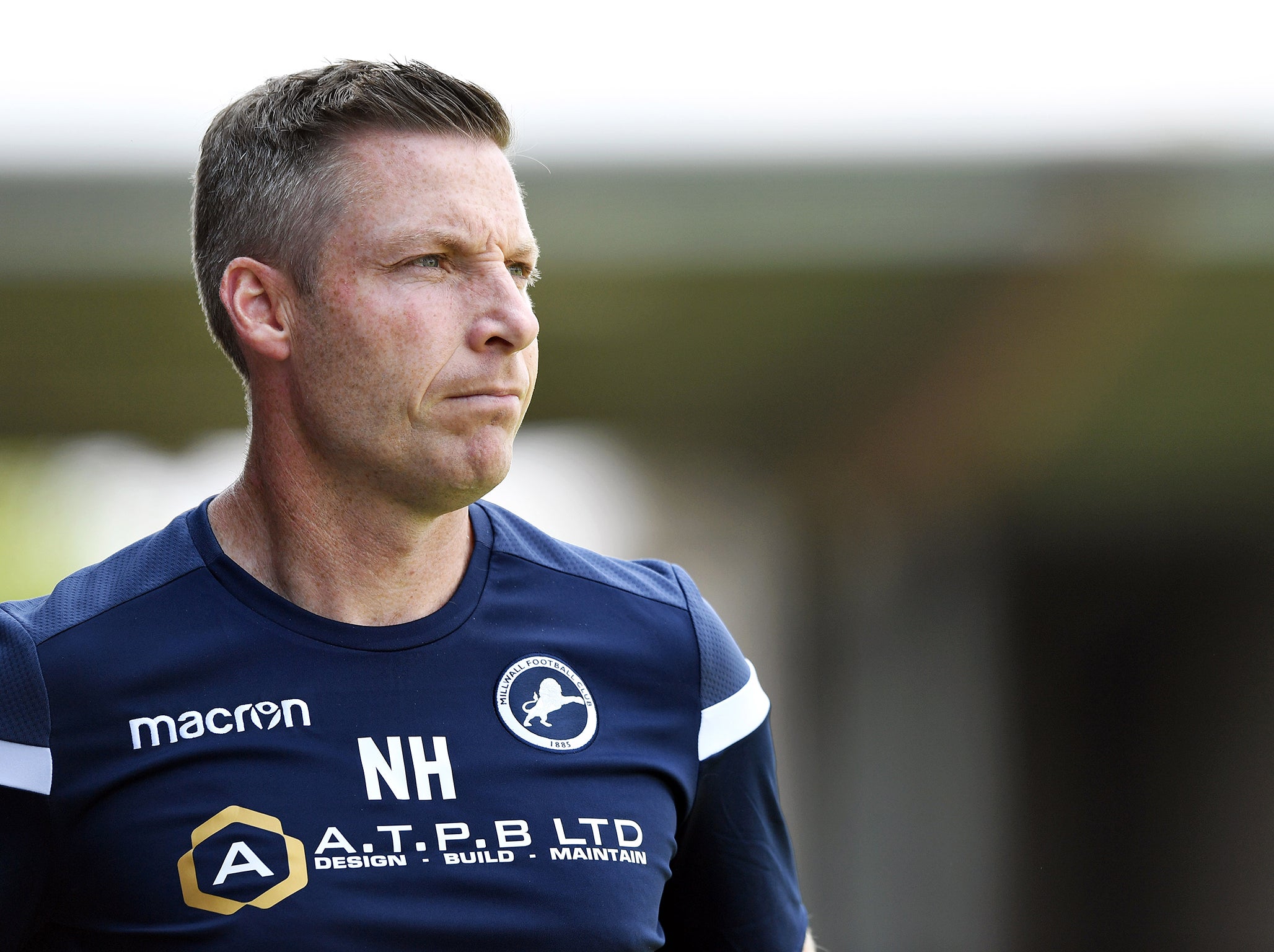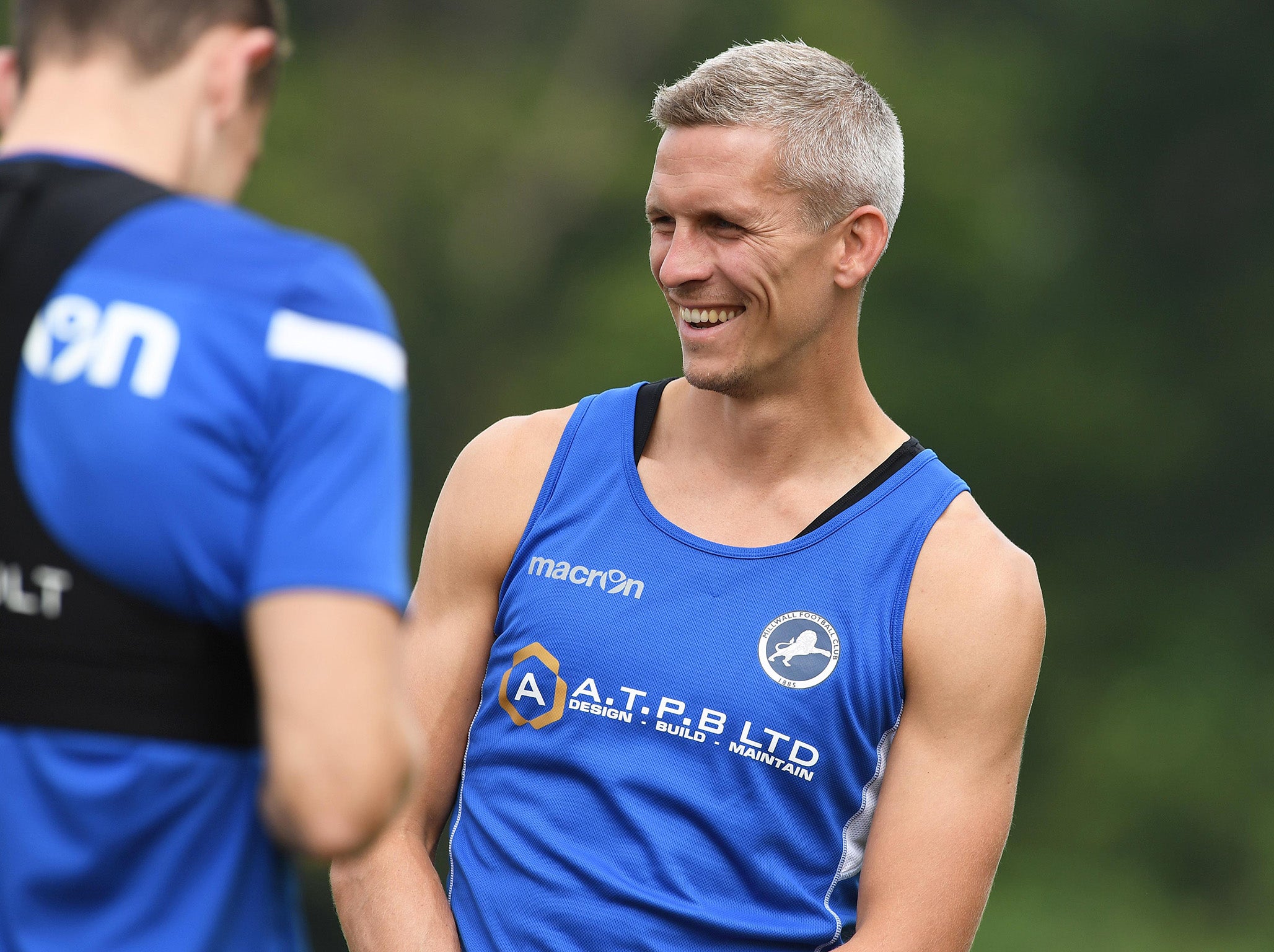Why Millwall are not ready for the Premier League, and they’re perfectly happy about it
Manager Neil Harris and Steve Morison open up about the club's ambitions and why they’d be content finishing fourth from bottom

It’s a cool Friday evening in April. The smoke and smell of bubbling fat from a burger van mixes with the crowds in South Bermondsey as flurries of blue and white slip beneath the railway bridge, heading for The Den. The visit of Fulham, the most in-form team in the league, is awaiting them. Thanks to an unexpectedly roaring second half of the season, a win might hand Millwall hope of a play-off spot, with only two games to go. So, you’d expect the fans to be feeling the pressure. Think again.
Instead, smiles and laughter decorate the adjoining car park. “We don’t want to be in the Premier League for the sake of it,” one season ticket holder proclaims proudly, joking about the idea of visiting the Etihad and Old Trafford. “That’s not what we’re about.” And in spite of the comprehensive 3-0 defeat to Fulham, and missing out on the fight for top-flight action, that elation hardly wavered as their campaign came to a close.
Fast forward to pre-season, and while some may have expected the club to lift their ambitions – after finishing eighth in their first attempt back in the Championship – the objective remains a carbon copy of the previous year: to reach 50 points and avoid relegation. While some might argue that’s aiming too low, the truth is, it’s a healthy dose of pragmatism.
“If we’re fourth from bottom upwards, and that’s not being defeatist, it’s a positive season for us,” says manager Neil Harris, sitting comfortably in his office, which overlooks Millwall’s training complex in Ravensbourne.
“Your understanding Millwall fans of the modern era will say ‘we’re not ready’ [for the Premier League]. Millwall fans are brilliant like that. They’ll say ‘we ’re not ready, but we’ll do it’. And if we get to the play-off final, we’ll take 50,000 to Wembley, because we want to be in the Premier League. But realistically, let’s build over three or four years and get there when we’re ready.”
Harris, who is also the club’s all-time leading goalscorer, has been at the helm for just over three years, and he’s already the longest-serving manager in the league. It says something about his success that he’s still around, but it’s far more telling of the turbulent mix of impatient chairmen and fruitless plans to break into the big time.
He talks of a “party atmosphere” in the ground the day Millwall were relegated in 2015, because he’d shaken things up during his first few games in charge and formed a new positivity, which he took down with them into League One. But after a successful return to the Championship, he hopes there’s a sympathetic consensus in the stands.
“The fans have had a good time over the last three years,” says the 41-year-old with a smile. “There’s obviously pressure on us to keep that going. I think there’s a realism to us, to 99 per cent of the football club, but it’s not that easy in this division in the modern day to have the finances available.”
“I think that feel-good factor carries on from what I was trying to build over the summer, from using the tools that are possible to us,” he adds. “But also understand that it’s not easy. It’s not easy to keep recreating.”
This firm belief in sustainability and settling for less than the team might actually be capable of achieving is a view echoed vehemently by club captain Steve Morison. He’s content leading the team into that fight with a vivid awareness of the club’s position.

“If you start getting carried away I think that’s where you start losing focus and you start to struggle because you don’t look below you,” he says. “You start thinking ‘we’re going to be alright’ and eventually you start running out of games and you’re not alright. So, we need to have a focus, and the manager is spot on. That’s what we’ve talked about from the first day of pre-season.”
“Barring injuries, you’re going to see the same 18-20 players travel and play every week. We haven’t got a plethora of players to choose from, we’ve got a small, tight-knit squad and one of the lowest budgets in the league. And we do it all based on hard work and that will to win, and we do it as a team. We’re fighting a different battle to other teams in the league, so that’s why we aim for what we aim for. And that’s what stood us in good stead last year.”
Morison, who turns 35 this month, played alongside his manager during his first spell at Millwall in 2009. While he may not stand a chance of disturbing the boss’s goal tally, he has played a big part in the club’s revival from League One, even scoring the winning goal in the play-off final. Building “slowly and consistently” is the preferred route for the striker, rather than risk making radical adjustments and bold statements that may upset the order and risk them falling through the trapdoor again.
“This club tried to change a few years ago, and they fell flat on their face,” he says. “They’re not going to make that mistake again, and this manager is definitely not going to let that happen. Maybe one day we will have a bigger squad and we may be paying people a bit more money, bringing in 2,3,4 million-pound players, but there needs to be a gradual process, which we’re all a part of now.
“If they sign players like that they have to pay them a certain amount of money. And if they don’t perform, the fans will be quick to throw it back in their face. So, we know where are as a club. We know what we’re about. That’s why we do things the way we do.”

Equilibrium is key for Millwall, and Harris is hardly one to tinker with his line-up, which can often stretch 10 games without a single switch. And that attitude is reflected in the club’s transfer policy too. They are yet to break a record fee of £800k set almost three decades ago, and that might not change any time soon, because ultimately their approach doesn’t centre around money.
The manager claims that some national newspapers are already picking the club to finish in the bottom three because of their small budget, but says proving those people wrong is a challenge they enjoy. However, as a new season commences – with three more top flight castaways drifting ashore – life in the Championship means more money to compete with than ever before.
“If someone wants to give you a pot of gold to spend to try and get promoted, then you take it and you have a go with it,” says Harris. “Will we be that club? No, I don’t think so, and I don’t begrudge any club that opportunity, not at all. Or certainly not any manager. You get the money to spend, you go spend it.”
“It doesn’t get any easier when you get parachute payments at the levels they’re at, and the Premier League money is at the level it’s at,” he adds. “The disparity between the Premier League and the EFL just grows wider and wider, and the fact that with financial fair play, the punishments [for breaking the rules] are embarrassing in my opinion. But it’s like that because teams keep having a go. While there’s no points deductions, teams will keep doing it and doing it. Wait for the investment, pay the fines and move on to the next season.”
While The Den isn’t void of negativity – Harris admits not everyone is happy with his slow and steady course of action – there seems to be a belief that his attitude transcends the touchline. One that is embraced by those in the stands who enjoy creating that infamous “unfriendly environment” for visiting teams, which Harris knows the club prides itself on, and he doesn’t intend to adjust.
“The basics won’t change at this club, certainly not while I’m in charge,” he claims. “Passion and pride, and the physical attributes of the game, and working the opponent and fighting the opponent – that’s the motto and ethos of the club.”
“It’s my job to create a Millwall team and culture and playing style that the fans want to turn up to see, and last year in particular they saw that and the connection between the fans and the pitch is huge, and that’s never lost on me, that’s the most important thing.”
Join our commenting forum
Join thought-provoking conversations, follow other Independent readers and see their replies
Comments
Bookmark popover
Removed from bookmarks